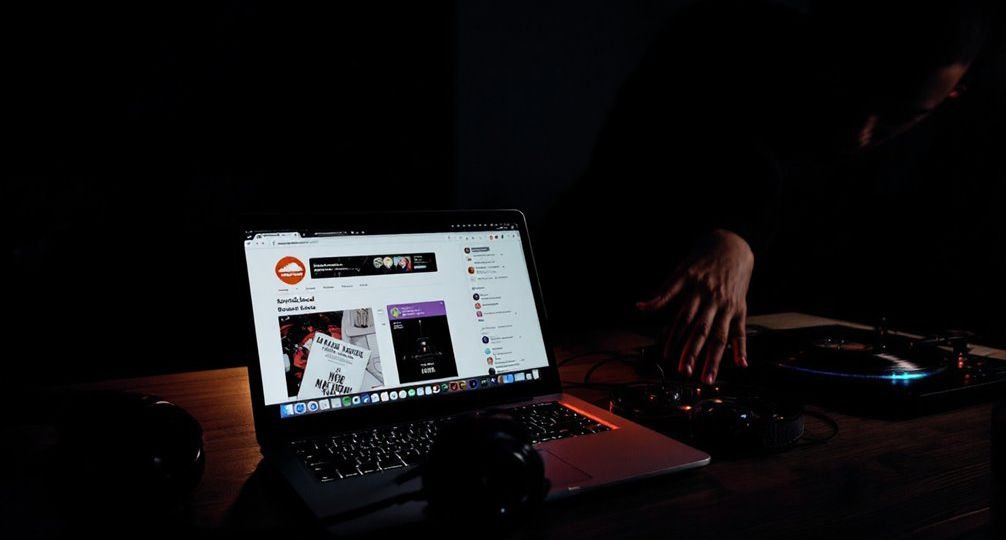
Are bootlegs allowed on SoundCloud?
Maneuvering SoundCloud’s terrain requires understanding bootlegs and copyright implications. You can’t ignore the platform’s strict content policies, which often lead to the removal of unauthorized recordings. SoundCloud uses an automated system to detect copyright infringements, so your uploads might face scrutiny. Are there ways to share bootlegs without running afoul of these rules? Securing permissions and familiarizing yourself with Creative Commons might be your path forward.
Key Takeaways
- Bootlegs are generally not allowed on SoundCloud due to copyright infringement risks.
- SoundCloud’s Content ID system removes unauthorized bootlegs upon detection.
- Explicit permission from all copyright holders is necessary for legal bootleg uploads.
- Uploading bootlegs without permission can lead to account suspension under SoundCloud’s three-strike policy.
- Legal bootleg uploads require understanding and adherence to SoundCloud’s copyright policies.
Understanding Bootlegs in the Music Industry
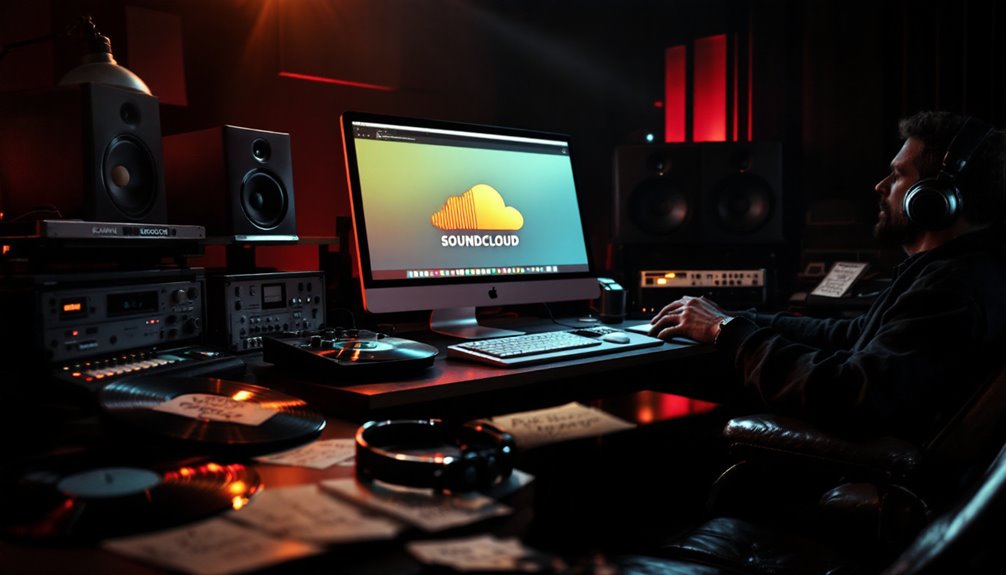
When examining bootlegs in the music industry, it’s crucial to recognize their origins and definitions. The term “bootleg recording” stems from the illicit smuggling of alcohol during Prohibition, highlighting its underground roots.
In the domain of music, bootlegs are unauthorized recordings, distinct from counterfeits, meant to preserve and share live performances or unreleased sessions. They’re pivotal in bootleg culture, offering fans rare insights into artists like Bob Dylan and The Beatles.
Such recordings capture unique moments, enriching music preservation by documenting performances that official releases might overlook. This culture thrives in rock history, demonstrating an artist’s cultural relevance. Numerous bootlegs exist, including Bob Dylan’s “Great White Wonder” and Prince’s “Black Album,” which are iconic in the world of unauthorized recordings.
Through bootlegs, you gain access to music that fuels innovation and engagement beyond traditional industry constraints.
Copyright Implications of Bootlegs
While bootlegs might offer intriguing insights into unreleased or live performances, they carry significant copyright implications that can’t be ignored.
In the bootleg culture, your creations are subject to SoundCloud’s automated content identification system. It detects and removes flagged bootlegs, even if only small parts of the original track are used.
Copyright holders possess exclusive rights over their work, and using it without permission infringes these rights, leading to potential removal or account suspension. Since multiple copyrights may exist within a single work, obtaining the necessary permissions from all copyright owners is crucial to avoid infringement. The legal ramifications extend to copyright strikes, affecting your ability to monetize and maintain your account.
Ethically, it’s vital to respect original creators’ rights, as unauthorized use disrupts the intended control and distribution of their content, challenging both legal and industry standards.
Securing Permissions for Bootleg Creations
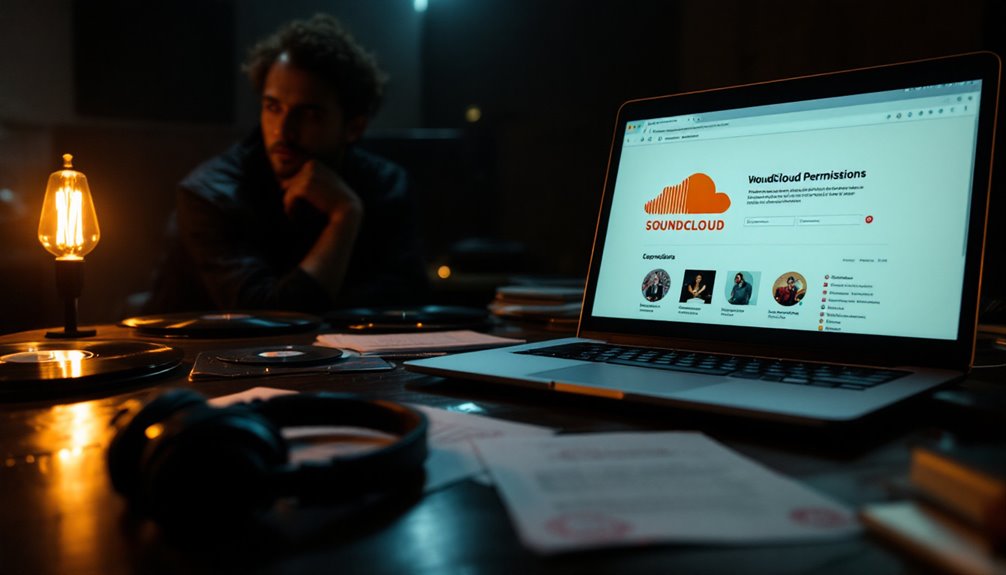
Understanding the copyright implications of bootlegs highlights the importance of securing proper permissions for your creations. In the bootleg culture, respecting remix ethics is essential. Start by identifying copyright owners using platforms like Spotify and databases such as BMI or ASCAP. Examine song metadata and contact record labels for accurate ownership details. When reaching out to rights holders, draft a professional email with “Copyright Permission Request” as the subject, detailing your remix intentions. Utilize social media or official websites to find contact information. Negotiation is key—propose terms for remix licenses, including royalties and credits. Explicit permission from the copyright holder is required to avoid infringement and ensure your work respects legal boundaries. Always document permissions in writing. Failure to secure permissions risks content removal, account termination, and legal actions, jeopardizing your credibility and innovation potential.
Creative Commons and Bootlegs
As you explore the world of bootleg creations on SoundCloud, understanding Creative Commons licenses becomes vital for guaranteeing legal compliance. Creative Commons offers a framework for remix culture, allowing you to legally create derivative works, including bootlegs. Licenses like CC-BY and CC-BY-SA permit such creations, while those with No-Derivatives restrictions do not. SoundCloud provides a primer on Creative Commons licensing, helping users understand their options for uploading and licensing music. To verify your bootlegs align with legal standards, always check the license terms. Platforms like Free Music Archive and ccMixter offer CC-licensed tracks ideal for remixing. Proper attribution to original artists is significant, including name, track, and links. Remember, compliance with license conditions not only fosters innovation but also respects the creative intent of the source material. Stay informed and diligent in your creative endeavors.
SoundCloud’s Policies on Bootlegs

When you upload bootlegs to SoundCloud, the platform’s Content ID system carefully analyzes your track against a database of copyrighted material, increasing the likelihood of detection for unauthorized samples. If your upload triggers a match, you face immediate consequences such as content removal and potential copyright strikes, with three strikes leading to account suspension. To comply with SoundCloud’s policies and avoid these violations, guarantee you have the necessary rights or permissions for any content you wish to share. It is important to note that SoundCloud partners with security service providers like Cloudflare to enhance their platform’s protection against unauthorized uploads.
Bootleg Upload Restrictions
Uploading bootlegs on SoundCloud is tightly regulated, necessitating adherence to specific policies and permissions. In the innovative domain of bootleg culture, respecting remix ethics is paramount. You must secure explicit permission from original copyright holders, ensuring all elements, like samples and beats, are licensed. This adherence prevents infringement and preserves the creative ecosystem. Access to specific websites may be restricted due to security protocols, emphasizing the importance of following guidelines to avoid blocks. Always consider Creative Commons licenses, provided you follow their terms. Opting for original content minimizes copyright risks, while understanding “fair use” is essential if incorporating copyrighted material. Proper attribution, including the artist’s name and track title, is important.
Ignoring these guidelines can lead to copyright strikes or account suspension. Proactively resolving disputes and removing infringing content upholds SoundCloud’s harmonious community and supports sustainable innovation.
Content Identification System
SoundCloud’s rigorous policies on bootleg uploads extend beyond manual checks to an advanced Content Identification System, ensuring compliance with copyright laws. This automated system excels in content detection, scrutinizing audio files for unauthorized materials.
Here’s how it works:
- Automated Detection: The system scans uploads against a database of copyrighted files, similar to Shazam, recognizing and flagging even modified tracks.
- Audio Analysis and Matching: It identifies patterns or segments that match copyrighted material, regardless of remix challenges you might introduce.
- User and Title Considerations: Using “bootleg” in titles can trigger detection, though audio analysis remains primary.
- Impact on Remixes: Unofficial remixes face takedowns, highlighting the system’s efficiency and SoundCloud’s commitment to legal compliance. Websites like bytescare.com also employ security services to prevent unauthorized actions, ensuring protection similar to SoundCloud’s robust monitoring.
Consequences of Violations
Despite any creative liberties you might take in producing bootlegs, compliance with SoundCloud’s copyright policies is non-negotiable, and violations carry significant consequences.
A robust consequences overview reveals that account penalties include track removal and potential suspension under a three-strike policy. Persistent offenders face permanent exclusion. Infringing content is swiftly removed, and users are notified, emphasizing the importance of diligent user responsibilities. Abusive reporting of copyright infringement, especially by those who are not rightsholders or authorized agents, can lead to severe consequences, including civil liability or account termination.
Legal and financial implications are severe; unauthorized reporting can lead to civil liabilities, while infringement risks lawsuits from copyright holders. Ensuring proper permissions is vital to maintaining your reputation and legal standing.
Adherence to community guidelines is mandatory, prohibiting misrepresentation and spammy activities. You’re ultimately responsible for your account’s activities, underscoring the need for vigilance.
Risks of Using Copyrighted Material
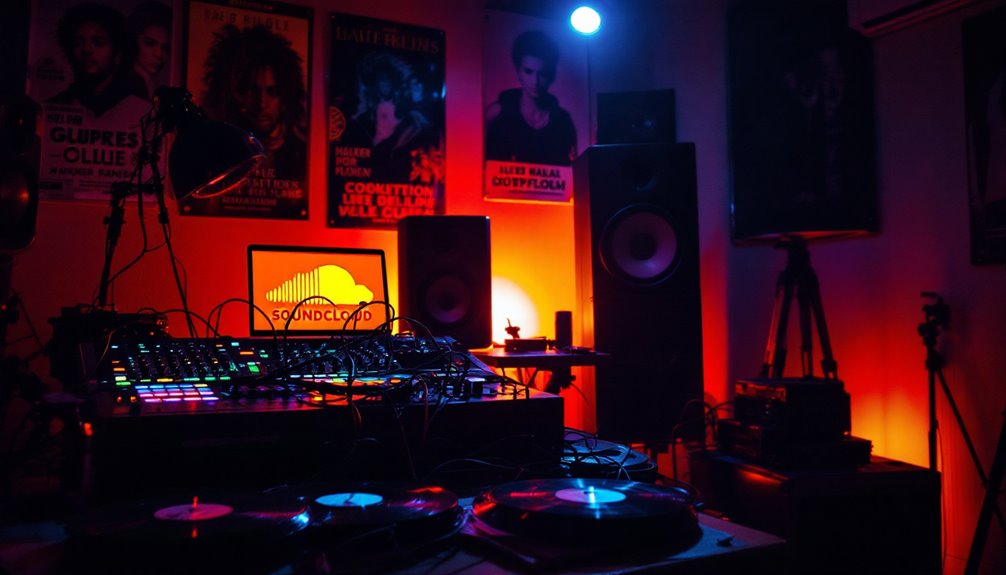
When you use copyrighted material without permission, you expose yourself to significant legal and technical risks. Understanding the copyright risks and legal implications is essential for anyone maneuvering digital platforms.
Here’s what you could face:
- Legal Consequences: Lawsuits may be filed, resulting in fines, legal fees, and even imprisonment for willful infringement. Statutory damages for copyright infringement can range from $750 to $30,000 per offense, and in cases of willful infringement, damages may reach up to $150,000, along with potential criminal charges.
- Technical and Security Risks: Misconfigured file-sharing software can lead to unauthorized access, malware transmission, and vulnerabilities exploitable by hackers.
- Platform-Specific Penalties: On SoundCloud, copyrighted uploads can trigger strikes, track deletions, and account suspensions.
- Impact on Publication and Licensing: Unauthorized use can severely hinder your ability to publish or license your works.
The Importance of Written Permissions
Although traversing the complexities of copyright law can be challenging, securing written permissions from rightsholders is essential when sharing content on platforms like SoundCloud. You must obtain written consent from all relevant rightsholders, ensuring compliance with copyright agreements. This includes adaptations or public performances of their work. Without permission, uploading content risks removal and account termination. Deeper than mere compliance, securing permissions respects the creator’s rights and supports innovation by fostering a collaborative ecosystem. Unauthorized use not only breaches legal boundaries but also jeopardizes the financial and reputational interests of original creators. SoundCloud enforces strict policies, utilizing content recognition technology to safeguard rightsholders’ interests. Consequently, your proactive engagement in obtaining necessary licenses is both a legal obligation and an ethical imperative. It is important to understand that links to SoundCloud on platforms like Scratch must adhere to community guidelines, which means ensuring all shared content is appropriate and compliant with copyright laws.
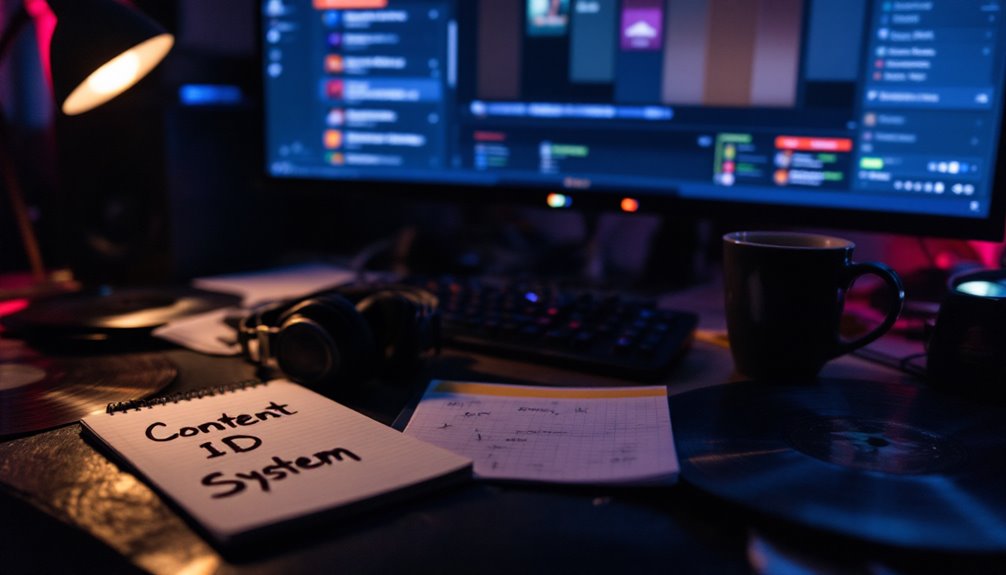
SoundCloud’s Content ID system is a robust digital tool designed to protect copyright holders, using advanced content recognition technology to identify and flag unauthorized tracks.
As a content creator, steering through this system involves understanding its intricacies:
- Automatic Detection: The system uses technology similar to Shazam to spot copyright-protected content, even with slight modifications.
- Rights Management: Modifying track names or formats mightn’t evade detection, as the system scans thoroughly.
- Upload Process: Be mindful that copyright holders can preemptively flag tracks, resulting in automatic removal.
- Consequences: Repeated violations can lead to account penalties, so consider platforms with different recognition systems or verify your content is considerably modified.
Innovative content creation requires strategic rights management to thrive on SoundCloud.
Addressing Copyright Claims on Bootlegs
When you receive a copyright claim notice for a bootleg on SoundCloud, it’s crucial to review the details and gather any evidence of permission you might’ve secured from the original copyright holder. If you possess such evidence, you can submit it through SoundCloud’s dispute resolution process to address the claim effectively. However, without clear permission, resolving claims becomes challenging, and repeated issues could jeopardize your account’s standing. It’s important to note that automatic identification tools often flag original work as similar, which can complicate the resolution process.
Handling Claim Notices
How should you handle claim notices about bootlegs on SoundCloud? First, understand that Claim Notifications require your immediate attention. As a user, you’ve got responsibilities to manage these effectively. Here’s a strategic approach:
- Review the Notice: Analyze the claim details to understand the infringement specifics. Check if the bootleg was flagged by Content ID or reported by a user.
- Evaluate Your Content: Determine if your remix indeed infringes on copyright. Consider significant changes made and existing permissions. SoundCloud utilizes Content ID, an algorithm that scans uploaded tracks against a database of registered copyrighted works to identify potential copyright infringements.
- Dispute If Necessary: If you believe the claim is erroneous, carefully prepare evidence for SoundCloud’s dispute resolution process.
- Prevent Future Issues: Confirm future uploads don’t infringe by using royalty-free or original content.
Addressing claims promptly can safeguard your account and foster innovative content creation.
Evidence of Permission
Securing evidence of permission is essential in addressing copyright claims on bootlegs. In the dynamic world of bootleg culture, obtaining explicit written permission from the original track’s copyright holder is crucial. This includes all forms of sampling, covers, and remixes.
Verbal agreements aren’t enough; you need written proof to safeguard your creative endeavors. Reaching out to artists, record labels, or management demonstrates adherence to sampling ethics.
Additionally, consider using Creative Commons licensed tracks from sites like Free Music Archive or ccMixter, ensuring the license aligns with your intended use. Proper attribution is non-negotiable, listing the original artist, track title, and relevant links in your description.
Without permission or attribution, copyright claims become inevitable, potentially stifling your innovative pursuits.
Dispute Resolution Steps
Maneuvering the intricate process of dispute resolution on SoundCloud requires a precise understanding of copyright claims.
To effectively address copyright nuances regarding bootlegs, follow these steps:
- Understand the Claim: Grasp the specifics, including disputed material and the claim’s basis.
- Gather Evidence: Compile compelling evidence of your ownership or rights to use the material legally.
- File a Dispute: Use SoundCloud’s dispute resolution process to contest the claim, highlighting your legal grounds.
- Fair Use Considerations: Assess whether your usage qualifies under fair use exceptions, requiring detailed legal knowledge. It’s crucial to provide detailed information in your claim, as this helps expedite the resolution by clarifying the situation for SoundCloud’s review team.
Best Practices for Uploading Bootlegs
When uploading bootlegs to SoundCloud, it’s crucial to navigate the platform’s copyright environment meticulously to avoid potential pitfalls. Embrace the bootleg culture with a focus on remix ethics. Start by securing explicit permission from copyright holders, documenting this to preempt disputes. Leverage Creative Commons licenses when possible, ensuring you provide proper attribution to original creators. Familiarize yourself with SoundCloud’s policies to avoid unintentional breaches.
Use royalty-free music and original elements to sidestep copyright issues. Consider private sharing initially to resolve potential problems before going public. Avoid monetizing without proper licenses. Respecting copyright laws ensures a positive experience on SoundCloud, as artists can share their work without legal concerns.
If a track is flagged, respond promptly with evidence of permissions. These strategies help innovate within the bounds of legality, ensuring your bootlegs thrive on SoundCloud.

